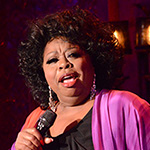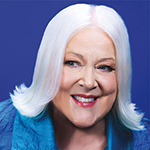Susan Mack
No More Blues
Birdland, NYC, June 10, 2024
Reviewed by Alix Cohen

Photo: Kevin Alvey
Susan Mack tackles positivity with the determination of a salmon swimming upstream. She vibrates with it. At a time when the world is in turmoil, music becomes a shared respite, a test of faith. Her vocals are expansive, and her presentation is open hearted. Mack also brings glamour to the stage.
Duke Ellington’s “Love You Madly” began attractively with David Finck’s deft bass easing into swing. Mack favor melisma and darting notes—think Annie Ross’ “Twisted.” (She might consider a show of World War II-era songs.) The lyrics were delivered almost like scat. Tim Armacost’s sax took off with his shoulders tilted, his knees bent, and his eyes scrunched. “Blue or not, we plan on leaving you with magic,” Mack saif as she grinned. “Joy Spring” (Clifford Brown/Jezra Kaye) had a similarly dexterous approach. Her phrasing zig-zagged as though she was on a playground, but her enunciation was pristine; THIS was happy.
An emphatic “I’m Gonna Live Til I Die” (Al Hoffman) was peppered with an infectious “Hallelujah!”; Mack’s eyes blazed. As she bent towards the front-row audience, Mack inquired “Are You Having Any Fun?” (Sammy Fain/Jack Yellin): “Even the old grey mare down home/Has got to have hay, hey!/You better have some fun.” Her gestures were minimal, and her arms sometimes rose organically.
Carl Sigman/Bob Russell’s classic “Crazy He Calls Me” was believable even though Mack’s introduction that referred to her son rather than a romantic attachment. Tedd Firth’s piano mused melodically. Sentiment swelled, but Mack never went over the top. The number was internalized. Her continuing reference to the kids led to “Waltz for Debby” (Bill Evans/Gene Leeds) in tandem with “Never Never Land” (Jule Styne/Comden & Green). It was winning, but once again, only a glance to where her children sat took her gaze towards the audience.
Singing in Portuguese has been on Mack’s bucket list. This year she took lessons from a teacher in Rio via Zoom. “I hope no one in the audience speaks Portuguese,” she quipped. The title song, “Chega de Saudade/No More Blues” (Antonio Carlos Jobim/Vinicius de Moraes, English lyric by Jon Hendricks), sashayed, first in its original language, then in English. The tempo and rhythm were sheer Carnivale. The shusshh sound and inflection seemed authentic; her hips reflected spirit. At the piano, Firth almost danced. More of this please.
Like any singer, the artist told us, she gravitates to writers who articulate what she feels. Mack’s own “A Brighter Day” furthered her message: “Music is the lover who will hold me tight/And when it starts to play/Then it’s a brighter day.” It was a cha-cha. The scat conversation with the sax was appealing. Both musicians tapped their feet and shifted their knees. At the drums, Eric Halvorson grinned with his sticks.
Buddy Johnson’s “Save Your Love for Me” floated in plaintively. The sax was melancholy and the cymbals swished; Mack’s eyes were closed as her hand rested on the piano. Taking it down a bit would have served. This show was rife with similar levels. Every song either began slowly and low and then took off or took off from the get-go. A couple of quieter, less-dense efforts would have been nice. Perhaps “There Will Never Be Another You” (Harry Warren/Gordon Mack) with only piano would have been welcome; Mack has the control and finesse to do it.
“If It’s Magic” (Stevie Wonder) completed the evening: “If it’s magic/Why
can’t we make it everlasting?/Like the lifetime of the sun/It will leave no heart undone/For there’s enough for everyone.” The bass was cottony, and the vocal was lovely. The show was directed by Lina Koutrakos.





